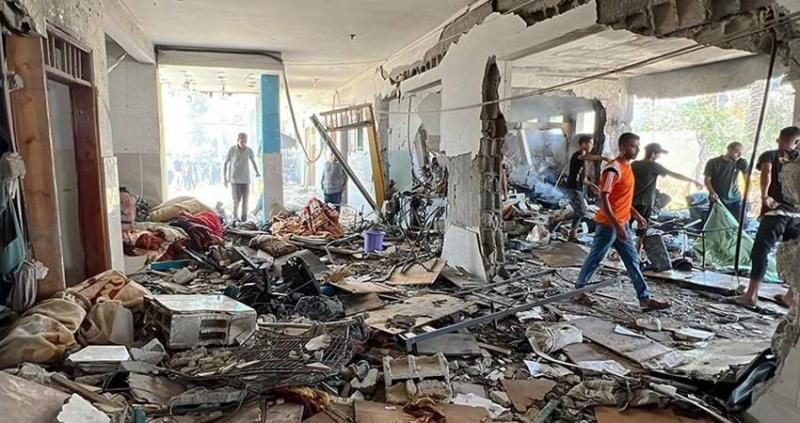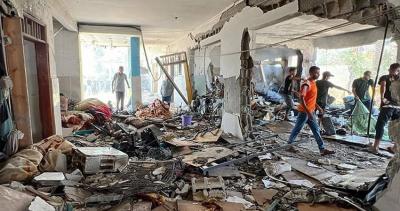The assassination of Hamas political bureau chief Ismail Haniyeh in an attack blamed on Israel has raised fears of a wider regional conflict and led to the sidelining of talks aimed at ending the nearly ten-month ongoing war in Gaza. Since Hamas's attack on Israel, which sparked a devastating retaliatory response, Qatar has acted as a crucial mediator with the armed Palestinian group, with Haniyeh residing in Doha. Along with Egypt and the United States, Qatar had been leading behind-the-scenes discussions for months aimed at securing a second ceasefire, following a week of halted fighting in November when dozens of Israeli and foreign prisoners were released in exchange for Palestinian detainees.
However, in the hours following Haniyeh's killing in Tehran, Qatari Prime Minister Sheikh Mohammed bin Abdulrahman Al Thani expressed doubts about the success of future negotiations. He questioned on the platform "X": "How can negotiations take place where one party kills the one they are negotiating with at the same time?"
**Where Do the Talks Stand?**
Before Haniyeh's death, Hamas accused Israeli Prime Minister Benjamin Netanyahu of delaying a potential ceasefire in Gaza. At the time, Egyptian, Qatari, and American mediators had met with Israeli negotiators a week ago in Rome, where Hamas claimed that Israel had presented new conditions for reaching an agreement, a step that constituted a retreat from its previous position. U.S. President Joe Biden had outlined a so-called Israeli initiative for a ceasefire and prisoner release in late May, which became the basis for subsequent discussions. The United Nations Security Council endorsed this negotiating framework, but Israel reported that Hamas leadership complicated the deal and denied making changes to the outline draft.
The U.S. news site Axios reported on Saturday, citing Israeli officials, that talks on Saturday in Cairo between the Egyptian and Israeli delegations halted without making any progress, and Qatari negotiators were not present. Middle East expert Andreas Krieg, a military analyst and senior lecturer in security studies at King's College London, noted, "Even before Haniyeh’s death, the Israeli government, particularly Netanyahu, had not given any confidence to mediators in the past few days and weeks." He added that "the killing of Haniyeh, alongside the escalation in Beirut, does not indicate that Israel is genuinely interested in a ceasefire," referring to Israel's assassination of Hezbollah military leader Fouad Shukr in southern Beirut on Tuesday.
At the same time, Krieg clarified that the killing of high-ranking leaders from Hamas, Hezbollah, and others at earlier stages represents an opportunity for Netanyahu "to build a narrative of victory and use it as a chance to pursue ceasefire talks" from a different position.
**Haniyeh's Role in the Talks**
Haniyeh was elected as Hamas's political leader in 2017 and served as the primary face of the Palestinian movement on the international stage. He played a crucial role in discussions with mediators in Qatar, where Hamas's political bureau has been since 2012 with U.S. approval. Joost Hiltermann, director of the Middle East program at the International Crisis Group, stated, "Haniyeh was of course the main negotiator, but he couldn't make any decisions without the consent of everyone around him." He added, "Haniyeh was, in a way, a bridge figure; he was practical and wanted to get a deal done... and he seemed to act in good faith." Krieg noted that the former Hamas leader was "able to navigate some difficulties during the mediation process, which may have been a positive element lost with his death."
**Does the Iranian Response Affect the Talks?**
Iran and its allied armed factions in the Middle East have pledged to respond to the assassinations. Iran-backed groups in Lebanon, Yemen, Iraq, and Syria have already engaged in the ongoing ten-month war between Israel and Hamas in Gaza. Hiltermann indicated that in the worst-case scenario, with significant human casualties on the Israeli side, "all bets would be off" regarding the resumption of ceasefire talks. He added, "Then we would enter a dangerous cycle of escalation, during which there would be no discussions for prisoner releases or a ceasefire." He believes that even in the case of a less severe attack, "if Israel can withstand it and the U.S. convinces it to endure... it will give Netanyahu additional reason to procrastinate."
For his part, Krieg believes that one possible outcome of the escalation in Lebanon is pressure on Israel to make concessions, particularly because it "is unprepared for this war" and will need to "free up resources that are now tied up in Gaza." However, he added, "In the very near term, at least through August, I think that mediation and negotiations are likely over."




